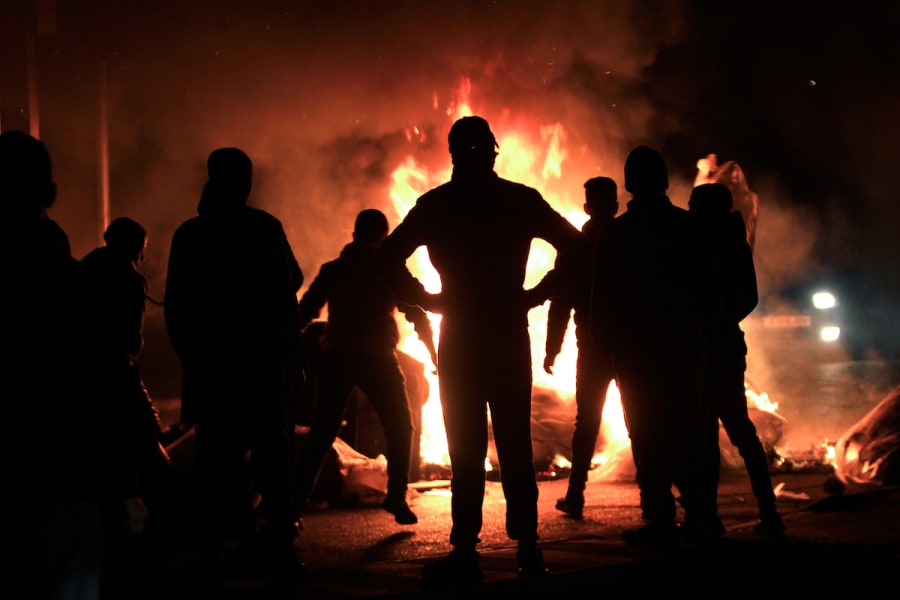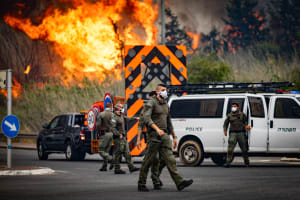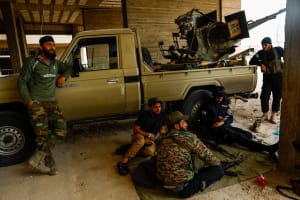Senior Israeli intelligence officer predicts escalation in local terrorist-related violence, Iranian regime’s survival
Brig.-Gen. Amit Saar warned that increasing violence would become Israel’s second most serious challenge in 2023 after Iran

The head of the Israeli Defense Forces’ Military Intelligence Research Department predicted on Monday that the ongoing violence in the West Bank would escalate in the future.
Delivering a speech at the military think tank Gazit, Israeli Military Intelligence head, Israeli Brig.-Gen. Amit Saar, warned that the increasing violence would become Israel’s second most serious challenge in 2023 after Iran.
“People can say nothing has changed … The terror is seasonal, every few years we have a wave and afterward it calms down and comes back. There are people in the security establishment who believe this to be the case, but I think otherwise,” Saar said.
“I think we need to examine what we have seen in recent months – not through the [prism of the] number of attacks, but the causes,” he added.
For many years, the State of Israel embraced a policy of managing, rather than permanently ending, the unsustainable political violence in the disputed region. However, the Israeli general said his gloomy prediction comes from the conclusion that it will become increasingly difficult for Israel to continue managing the conflict at relatively low costs.
“We are seeing the foundations that allowed us to manage the conflict beginning to falter. We are far from being able to solve the conflict, but there were foundations allowing us to manage the conflict at a relatively low cost for years,” Saar said. “These foundations in the past year, and heading into 2023, are going to become unstable.”
For months, Israeli security forces have fought an ongoing wave of terrorism sweeping across the West Bank, taking the lives of 19 Israelis earlier this year.
On Monday in Jenin, Israeli security forces arrested Yahya al-Saadi, the son of the senior Palestinian Islamic Jihad terrorist Bassam al-Saadi. Al-Saadi’s associates clashed with the arresting soldiers, throwing bombs at IDF personnel, and a second terrorist was killed during the ensuing firefight.
In the past, the limited security cooperation between the Palestinian Authority (P.A.) and Israel succeeded to periodically reduce levels of violence in the region. However, in recent years, the P.A.’s credibility has eroded dramatically in the eyes of ordinary Arab residents of the West Bank.
Mahmoud Abbas’ P.A. regime is widely perceived as corrupt and lacking the legitimacy to rule the local Arab population. This development undermines the P.A.’s authority and ability to maintain law and order in areas under its official jurisdiction. The political vacuum has created a fertile ground for growing terrorism.
Saar described this as a combustible and dangerous situation.
“I see young people who get up at 4 a.m. just to throw stones at IDF armored vehicles entering the village. It’s alarming to think how much anger is needed for this. They lash out at everything – the P.A., Hamas, the [other] organized groups. They are angry and exposed to weapons and incitement. They want to make their own ‘story’ and put it on TikTok,” Saar said. “It’s much more complicated to deal with.”
Turning to Iran, Saar said he believes Iran’s ayatollah regime will “manage to survive” the unrest sweeping across numerous Iranian cities and regions in the form of anti-regime protests.
Saar said he believes that the ayatollah regime, which seized power after the 1979 Islamic Revolution, has capabilities to deal with the ongoing unrest.
“It has constructed very strong tools for dealing with such protests,” he said.
Iran’s Islamic Republic has killed more than 400 civilian protesters since mid-September, including 51 children and 27 women.
The ongoing anti-regime protests in Iran began with the killing of a 22-year-old Kurdish woman, Mahsa Amini, by Iran’s notorious “morality police,” which enforces a strict Islamic dress code, including a hijab, or head covering, for women.
Last Saturday, Iranian Attorney General Mohammad Jafar Montazeri claimed the morality police would be disbanded, but on Sunday, Iranian regime-controlled TV media denied this would happen.

The All Israel News Staff is a team of journalists in Israel.














